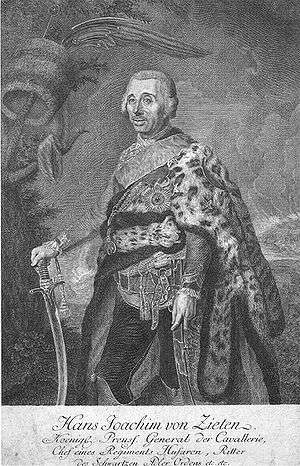Hans Joachim von Zieten
| Hans Joachim von Zieten | |
|---|---|
 | |
| Nickname(s) | Zieten aus dem Busch |
| Born |
14 May 1699 Wustrau, Brandenburg |
| Died |
26 January 1786 (aged 86) Berlin |
| Allegiance |
|
| Service/branch | Army |
| Rank | General |
| Commands held | Zieten Hussars |
| Battles/wars | |
| Awards | Pour le Mérite |
Hans Joachim von Zieten[1] (14 May 1699 – 26 January 1786), also known as Zieten aus dem Busch, was a cavalry general in the Prussian Army. He served in numerous wars and battles during the reign of Frederick the Great.
Character
Zieten was a man of very small stature and had a very light voice, and these factors would lead him to have a quick temper as other men were quick to insult him. He liked to drink and was extremely defensive about his shortcomings, purportedly engaging in 74 separate duels, although it is unlikely that he actually killed all 74 of his opponents.
Beginnings
Zieten was born in Wustrau (now part of Fehrbellin) in the Margraviate of Brandenburg. He began his military career as a volunteer in an infantry regiment, retired after ten years' service, but soon afterwards became a lieutenant of dragoons. Being involved in some trade transactions of his squadron-commander, he was cashiered, but managed to obtain reinstatement, and was posted to a hussar corps, then a new arm. At that time light cavalry work was well known only to the Austrians, and in 1735 Rittmeister (Captain) von Zieten participated in the Rhine campaign under the Austrian general Baranyai (Baronay).
Promotion
In 1741, recently promoted lieutenant-colonel, Zieten met his old teacher in battle during the First Silesian War and defeated him at the Battle of Rothschloss. The chivalrous Austrian sent him a complimentary letter a few days later, and General Hans Karl von Winterfeldt, who had been in command at Rothschloss, reported upon his conduct so favourably that Zieten was marked out by King Frederick the Great for future higher command. Within a year he was colonel of the newly formed Hussar Regiment, and thereafter his advance was rapid. In the Moravian foray of the following year, Zieten and his hussars penetrated almost to Vienna, and in the retreat to Silesia he was constantly employed with the rearguard. Zieten received the Pour le Mérite for his success during the war.
Distinguishment and valor
Still more distinguished was Zieten's part in the Second Silesian War. In the short peace, the hussars, like the rest of the Prussian cavalry, had undergone a complete reformation. To their discipline they had added the dash and skirmishing qualities of the best irregulars, and the Prussian hussars were considered the best of their kind in Europe. Zieten fought the brilliant action of Moldau Tein almost on the day he received his commission as major-general. In the next campaign he led the famous Zietenritt (Zietenride) around the enemy's lines with the object of delivering the king's order to a distant detachment. At Hohenfriedberg (Striegau) and at Katholisch-Hennersdorf, the hussars covered themselves with glory, shadowing the enemy waiting to pounce on them. Hennersdorf and Kesselsdorf ended the Second Silesian War, but the Prussian army did not rest on its laurels, and their training during the ten years peace was careful and unceasing.
Seven Years' War
When the Seven Years' War broke out in 1756, Zieten had just been made lieutenant-general. At Reichenberg and at Prague, he held important commands, and at the disastrous Battle of Kolin (18 June 1757) his left wing of cavalry was the only victorious corps of troops. At Leuthen, one of the most brilliant battles of the 18th century, Zieten's cavalry began the fighting and completed the rout of the Austrians. In June 1758 he was sent to protect a convoy with supplies for the army besieging Olmütz, but could not prevent it from being completely destroyed at Domstadtl. Despite that he continued, during the whole of the war, to be one of Frederick's most trusted generals.
One of the few errors committed by Zieten in his military career was his misdirection of the frontal attack at Torgau, but he made up for this mistake by his assault on the Siptitz heights, which eventually decided the day.
Retirement

After the Seven Years' War, Zieten went into retirement, the hero alike of the army and the people. During the War of the Bavarian Succession, Frederick the Great forbade him to go, so he retired to his estate at Wustrau with his niece, Johanna von Blumenthal, whose son was serving in his regiment. During this period she gathered his reminiscences for a famous biography of him. Six years after Zieten's death in Berlin, Frederick's successor, King Frederick William II of Prussia, erected a column to his memory on the Wilhelmplatz in Berlin.
See also
References
-
 This article incorporates text from a publication now in the public domain: Chisholm, Hugh, ed. (1911). "Zieten, Hans Joachim von". Encyclopædia Britannica (11th ed.). Cambridge University Press.
This article incorporates text from a publication now in the public domain: Chisholm, Hugh, ed. (1911). "Zieten, Hans Joachim von". Encyclopædia Britannica (11th ed.). Cambridge University Press. - See the Lives by his niece, Johanna von Blumenthal (Berlin, 1800), by Hahn (5th ed, Berlin, 1878), by Lippe-Weisseafeld (2nd ed., Berlin, 1878), and by Winter (Leipzig, 1886).
- The German Way of War: From the Thirty Years War to the Third Reich (Robert M. Citino: Lawrence, KS: University Press of Kansas, 2005)
Footnotes
- ↑ The Nuttall Encyclopædia called him Johann Joachim von Ziethen
External links
| Wikimedia Commons has media related to Hans Joachim von Zieten. |